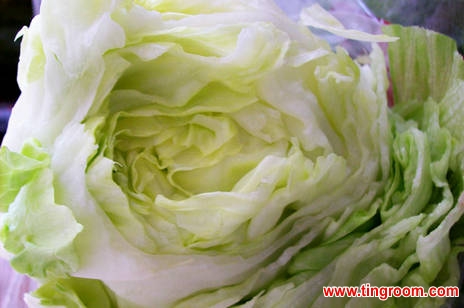-
(单词翻译:双击或拖选)
Why Lettuce1 Should NOT Be Frozen
Stroll through the frozen foods section of the supermarket and you’ll find frozen corn, peas, and beans. A Moment of Science wonders, why isn’t there any frozen lettuce?
Why Can’t I Freeze Lettuce?
Freezing is a relatively2 easy and convenient way to preserve many vegetables because it slows down or destroys the bacteria and enzymes3 that cause spoilage4. But, the freezing process itself can cause changes in food that can spoil the appetite.
During freezing, the water in every cell of the vegetable freezes and forms ice crystals. As we know from our ice cube trays, water expands in volume when it is frozen. In frozen vegetables, the ice crystals expand and damage the wall that surrounds each cell.
Damaged Cell
When the cell walls are damaged, the vegetable’s structure is weakened, and its texture5 becomes softer.
Some vegetables, like corn and peas, have a lot of starch6 in them but very little water. So they maintain their structure in spite of the cell damage. But, other vegetables, like lettuce and cucumbers, have a lot of water in them and more delicate cell walls. The ice crystals damage these vegetables so badly that they really can’t be frozen without turning into mush.
Ice crystals can reduce almost any vegetable to mush if poor freezing technique is used. Slow freezing creates larger ice crystals than fast freezing and causes more damage. Repeated thawing7 and freezing also creates larger crystals and can turn fresh, crunchy vegetables into unappetizing, mushy goo. Oddly enough, good freezing technique means boiling the raw vegetables for twenty seconds before quickly cooling and then freezing. The brief boiling makes the cell walls slightly more elastic8.
为什么莴苣不能冷冻
你在闲逛超市的冷冻食品区的时候,会看到有冷冻玉米、冷冻豌豆和冷冻大豆。《科学一刻》栏目很好奇,为什么看不到冷冻莴苣呢?
为什么莴苣不能冷冻?
冷冻是储藏很多蔬菜的一种相对简单、便捷的方法,因为它会减慢导致食物变质的细菌和酶的增长或者杀死它们。但是,冷冻过程本身就会改变食物,从而影响食物的口感。
在冷冻过程中,蔬菜的每个细胞中的水都会结冰。从制冰格我们可以知道,水在冻冰时体积会膨胀。对于冷冻蔬菜而言,冰晶膨胀会破坏蔬菜细胞的细胞壁
受损细胞
细胞壁受损时,蔬菜的结构就会变得不稳定,质地就会变软。
像玉米和豌豆这样的蔬菜含有大量的淀粉但含水量却不高,因此就算是细胞壁受损,它们的结构也不会发生改变。但是像莴苣和黄瓜这类蔬菜本身水分较多,且细胞壁也更脆弱,所以冰晶会对这类蔬菜造成很严重的影响,所以在没被捣碎的情况下最好不要将它们冷冻起来。
如果冷冻方法运用不当,冰晶几乎可以把任何蔬菜都变得软绵绵。慢冷冻所形成的冰晶要比快冷冻大,因而造成的损害也更多。反复的解冻和冷冻也会形成较大的冰晶,能够把新鲜的蔬菜变得黏黏糊糊,让人没了胃口。说来也奇怪,良好的冷冻方法竟然要把生蔬菜先煮沸20秒,然后快速冷却,最后再冷冻起来。短暂的煮沸可以使细胞壁变得更加有弹性。
点击 收听单词发音
收听单词发音
 收听单词发音
收听单词发音
1
lettuce

|
|
| n.莴苣;生菜 | |
参考例句: |
|
|
|
2
relatively

|
|
| adv.比较...地,相对地 | |
参考例句: |
|
|
|
3
enzymes

|
|
| n. 酶,酵素 | |
参考例句: |
|
|
|
4
spoilage

|
|
| n.(食物等)变质,损坏 | |
参考例句: |
|
|
|
5
texture

|
|
| n.(织物)质地;(材料)构造;结构;肌理 | |
参考例句: |
|
|
|
6
starch

|
|
| n.淀粉;vt.给...上浆 | |
参考例句: |
|
|
|
7
thawing

|
|
| n.熔化,融化v.(气候)解冻( thaw的现在分词 );(态度、感情等)缓和;(冰、雪及冷冻食物)溶化;软化 | |
参考例句: |
|
|
|
8
elastic

|
|
| n.橡皮圈,松紧带;adj.有弹性的;灵活的 | |
参考例句: |
|
|
|


















